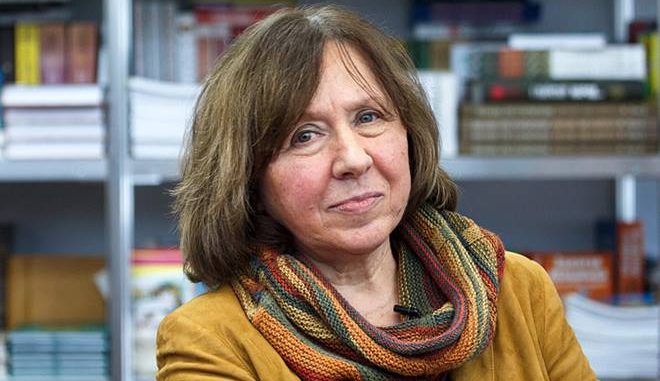
Today, Thursday 4th October 2018, RAW in WAR (Reach All Women in WAR) honours Svetlana Alexievich and her fearless journalism. Svetlana Alexievich has been, for many years, bravely speaking out about injustices in the post-Soviet space and giving voice to those trapped in conflict, past and present. She has repeatedly criticised the Russian annexation of Crimea and the human rights violations in the conflict in Eastern Ukraine, as well as the growing nationalism and the oligarchy in Ukraine, which brought threats against her from both Russian and Ukrainian nationalists.
For her first book War’s Unwomanly Face Svetlana Alexievich began to seek out female war veterans of the Second World War across the Soviet Union. A million Soviet women served at the front, but they were almost absent from the official war narrative. The book touches on topics that were taboo during the Soviet period, including the executions of deserters and the psychological effects of war. In October 2015, Svetlana Alexievich won the Nobel Prize in Literature for works that the prize judges called “a monument to suffering and courage in our time.”
On nominating Binalakshmi Nepram and Svetlana Alexievich to receive the 2018 Anna Politkovskaya Award, Ella Polyakova, chair of the “Organization of Soldiers’ Mothers of St Petersburg”, a member of the 2018 Award Nominations Committee, said:
“I think that the nomination of human rights activist Binalakshmi Nepram, her outspoken opposition to the conflict/war in Manipuri is important for all of us. We will be taking another step towards the realization that any war is a crime against humanity.
I am especially glad about Svetlana Alexievich’s nomination, who showed us the truth about the war in Afghanistan back in Soviet times. In my opinion, her books, especially “Zinc Boys”, helped turn public opinion in favour of peace. For example, we in the human rights organization “Soldiers’ Mothers of St. Petersburg” consider Svetlana Alexievich to be our inspirational forebear. At the current time, when the human rights movement in Russia finds itself in such a hard place with murders, “political prisoners”, “prisoners of conscience”, “foreign agents” and against a background of wars in Ukraine and Syria, Svetlana Alexievich’s nomination is very important to us. For us, she is a voice for morality, peace and love.”
Svetlana Alexievich did not stop speaking truth to power, despite the threats and intimidation, just like Anna Politkovskaya did. She returned to her native Belarus in 2011, after 11 years in exile, following threats and persecution under the regime of President Lukashenko and for the publication of her book about the war in Afghanistan. Svetlana Alexievich remains under a government “ban” – her books have not been published in Belarus, and she is de facto banned from making public appearances.
On accepting the award, Svetlana Alexievich said:
“Thank you for your letter and for awarding me this prize, it is so important to me today. My friends and I, we are all trying to resist the all-consuming grey gloom that surrounds us today, but our efforts are not visible!! But in order to remain true to ourselves, we continue to do our little bit all the same. Thank you for your support. We are strong for one another by the very fact we exist.
I knew Anna. I remember meeting her once in Oslo. We only had a little time and she and I went for a coffee, we sat in that cafe for two hours in all and she talked about Chechnya, it was a raw nerve. I told her I was terrified for her, how could a person withstand such an ordeal? And she said: “I couldn’t live any other way. A friend once told me that I even talk about it in my sleep.” To live a peaceful life seemed to her a betrayal of those who remained in Chechnya, she was always dying to get back there. Her soul was always there.
Anna loved life but was fearless. She said that there are many more people on the side of Good than we think. Not everyone has the courage to admit it, but it was they who helped her in Chechnya. And they often paid for it with their lives. Here, it was her belief in people that made the strongest impression.”
